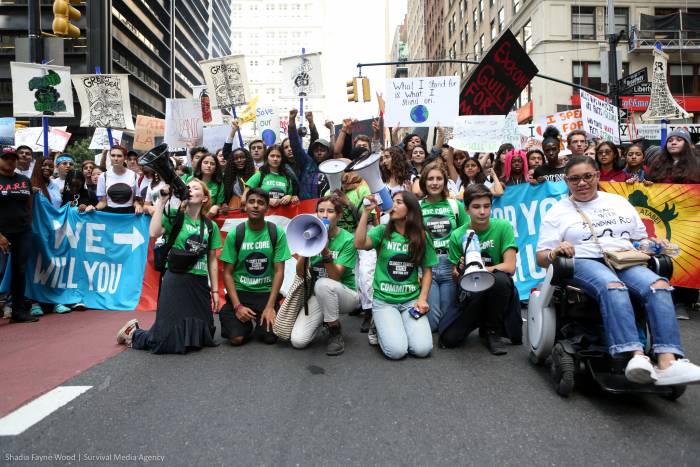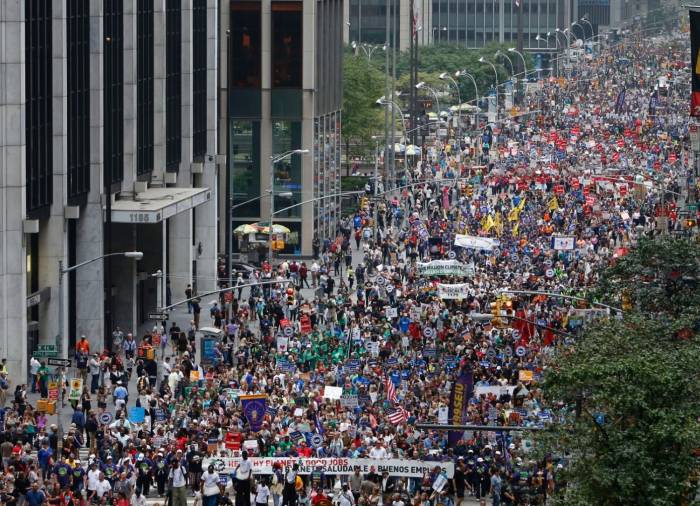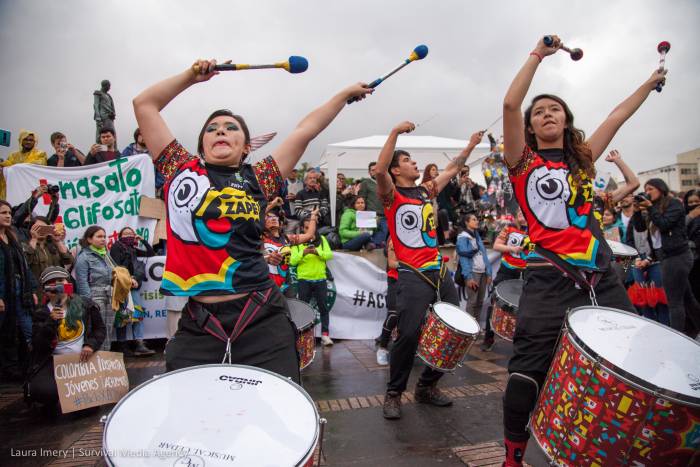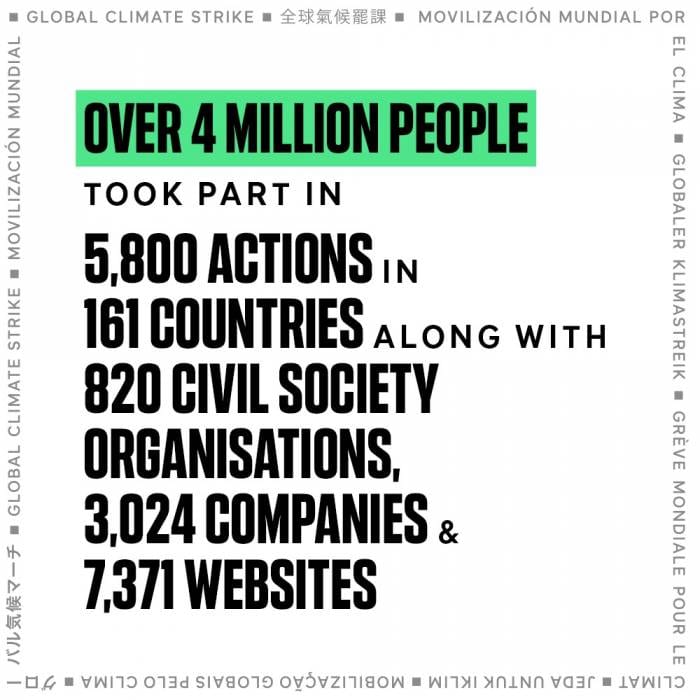On Friday I stood on the streets of New York surrounded by 300,000 people, as part of the biggest ever global climate mobilisation in the world. 5800 events in 163 countries, this is an incredible moment.
We are seeing a movement, made of people from all ages and backgrounds, trade unions, businesses, health workers, scientists, parents, celebrities and people of all faiths coming together in the streets to call for climate justice and an end of fossil fuels.
September 20th -27th is a demonstration of intent from the millions of people who are taking to the streets, taking time off work or school to say that they are ready. Ready to move on and make the changes we need for a world free from fossil fuels, and based in climate equity and justice.
We know the road ahead won’t be easy but what I felt on the streets of New York, and from talking to climate-strikers across the globe is a collective sense of purpose.
10 years ago 350.org was formed and we initiated our first ever day of global action ahead of the U.N. climate negotiations in Copenhagen. We had hoped to push delegates to adopt a strong, binding international climate treaty but we soon realised we had a hell of a fight on our hands. Since then we have worked across the globe to build a global grassroots movement to stop the march of the fossil fuel industry, the financing of fossil fuels and to put the building blocks in place to build a just transition that is fair for all.
There are times where it already feels we have lost so much: when we are watching the Amazon burn, or storms battering Mozambique, when we see the ascendancy of right-wing leaders like Donald Trump or when we see people forced to flee their homes because of climate impacts. Because we have known for a long time that this is going to happen and it’s only going to get worse.
If our own lived experience is not enough, the science is compellingly clear. We are heading for at the very least a 3ºC warming and catastrophic natural collapse that will not allow human life to thrive. We have to transform every sector from housing to transport to agriculture to accommodate a restorative, zero-emissions reality, and we have to ensure this process is well underway during the next 18 months to ensure the zero emissions goals of 2030 for developed nations.
We must stop the expansion of the fossil fuel industry immediately. Not a single new mine can be dug. Not another pipeline built. Not one more emitting powerplant fired up. And we have to get to work transitioning away from the systems we already have – doing so in a way that recognises the communities relying on these industries today but also acknowledges the harms that too many communities have suffered as a “side-effect” of fossil fuel use and extraction.
 Governments are accountable to the people, they have failed time and time again to address the climate crisis. It is time to reclaim this space and uphold the spirit on which these institutions were originally created. Government’s need to do what’s right, and fix this mess.
Governments are accountable to the people, they have failed time and time again to address the climate crisis. It is time to reclaim this space and uphold the spirit on which these institutions were originally created. Government’s need to do what’s right, and fix this mess.
International moments punctuate the political rhythm where governments present their plans to address the climate crisis. At these moments global climate politics are made visible and Heads of State make decisions. They support the build-up of a story that shames or praises climate leadership.
The UN climate action summit on September 23rd is the next of these moments. We want governments to make an ambitious plan to match the urgency of the climate crisis; with people’s safety and human rights at the center and firmly based on science. So far, they have failed to do so. It’s past time for the developed countries most responsible for this crisis to act.
The United Nations, and all multilateral processes must center the voices of those on the frontlines of the climate emergency: Indigenous communities, environmental defenders, people of color, the most vulnerable nations, women, young people, and others who have done little to create this crisis, but are already facing its most devastating impacts. Instead of handing a microphone to politicians who repeat the same false promises, we should be handing a megaphone to the frontline leaders who are calling for real solutions.
To do that, the coalition supporting the strikes that includes 350.org and Fridays for the Future are demanding an immediate end to fossil fuel extraction and consumption. That means an immediate end to all new fossil fuel infrastructure, fossil fuel subsidies; and to replace them with incentives to renewable technology worldwide.
We need a just transition to phase out fossil fuel extraction with new and decent green jobs and protection for workers, including recognising care work and gender imbalances of labour. And we need significant changes to financial flows to ensure people most at risk are able to mitigate damage, adapt and become more resilient.
The climate strikes have shown us that the fossil fuel industry is losing its fight.
- The divestment movement just passed $11 trillion dollars in funds committed to divest from coal, oil and gas, in addition to the hugea news of the University of California committing to divest as well.
- The Pacific Islands are calling for a phaseout of all coal burning and production and an end to fossil fuel subsidies.
- The UN Secretary General has called for an end to new coal plants after 2020.
These are the types of commitments we need to see out of the UN summit on September 23rd. And it’s the type of commitment we’re going to keep fighting for in the months ahead.

There are times when hope feels hard to find and there are days when hope is all around us. Yesterday was one of those days. We need to stay hopeful, because this is our once in a life-time opportunity to transform our world. We have shown that we are ready, that we can create the moments of the unprecedented activism, energy and passion for change, and now we need to use our power to escalate; amplify and escalate.
Working towards the global climate strike we built a massive coalition of partners and organisations that spanned the globe, and we will keep fighting. Whether it’s the wave of escalated actions taking place this week around the climate summit, the global climate strikes on the 27th of September, International Rebellion starting on the 9th of October or 350.org’s work in continuing to tackle fossil fuel infrastructure and the finance industry behind it – everyone of us has a chance to act – to turn the spirit of these global climate strikes into profound and lasting change.
September 20th- 27th are not the last days we take to the streets, but they are a new beginning: the dirty fossil fuel party is over
